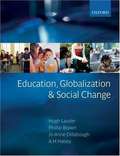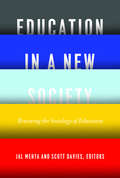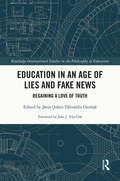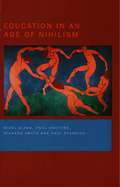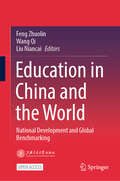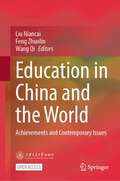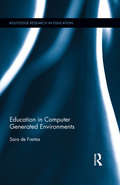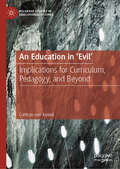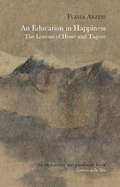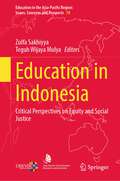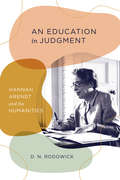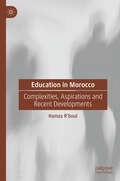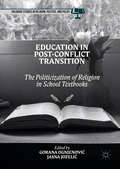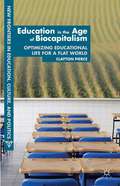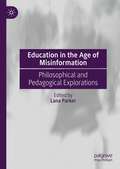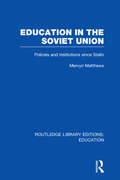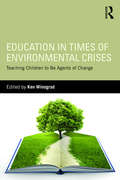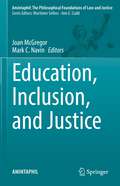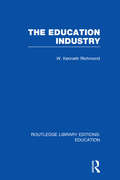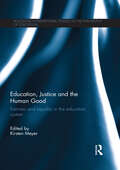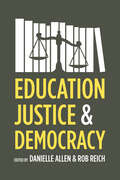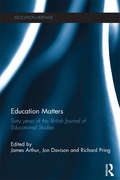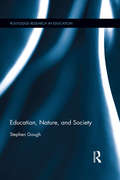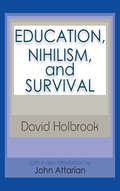- Table View
- List View
Education, Globilization and Social Change
by Hugh Lauder Phillip Brown Jo-Anne Dillabough A. H. HalseyEducation is seen as central to economic competitiveness, the reduction of poverty and inequality, and environmental sustainability. This book is an invaluable collection of key readings, with particular reference to globalization, for anyone concerned with the study of education at a time of major economic and social change.
Education in a New Society: Renewing the Sociology of Education
by Jal Mehta Scott DaviesIn recent decades, sociology of education has been dominated by quantitative analyses of race, class, and gender gaps in educational achievement. And while there’s no question that such work is important, it leaves a lot of other fruitful areas of inquiry unstudied. This book takes that problem seriously, considering the way the field has developed since the 1960s and arguing powerfully for its renewal. The sociology of education, the contributors show, largely works with themes, concepts, and theories that were generated decades ago, even as both the actual world of education and the discipline of sociology have changed considerably. The moment has come, they argue, to break free of the past and begin asking new questions and developing new programs of empirical study. Both rallying cry and road map, Education in a New Society will galvanize the field.
Education in an Age of Lies and Fake News: Regaining a Love of Truth (Routledge International Studies in the Philosophy of Education)
by Jānis John Tālivaldis Ozoliņš João J. Vila-ChãThe ‘post-truth’ world in which we live has been beset by fake news, lies and a cavalier disregard for truth. If truth is neglected then an alternative is an appeal to the emotions in order to validate a particular position, which can quickly turn to the use of power to impose a particular view. The loss of truth results in the loss of freedom. This book contends that if we want to preserve our freedom then we have a serious obligation to pursue truth. One way to do this is through an adequate moral education. Education in an Age of Lies and Fake News: Regaining a Love of Truth makes an argument for the importance of truth. It explores how we can retrieve the concept of truth and how moral education can be deployed in order to re-establish a commitment to truth. It introduces Eastern perspectives on the question of truth and how we view reality, and presents a realist position on the nature of truth as a counter to scepticism, drawing on Augustine and Thomas Aquinas, amongst others. Further, the chapters are mindful of the significance of developing a pedagogy which not only enables students to be critical thinkers, but to foster a genuine concern for truth and for its pursuit. This book will be essential reading for students, educators, philosophers and researchers pursuing the question of truth in the modern age.
Education in an Age of Nihilism: Education and Moral Standards
by Nigel Blake Paul Smeyers Richard Smith Paul StandishThis book addresses concerns about educational and moral standards in a world increasingly characterised by nihilism. On the one hand there is widespread anxiety that standards are falling; on the other, new machinery of accountability and inspection to show that they are not. The authors in this book state that we cannot avoid nihilism if we are simply laissez-faire about values, neither can we reduce them to standards of performance, nor must we return to traditional values. They state that we need to create a new set of values based on a critical assessment of contemporary practice in the light of a number of philosophical texts that address the question of nihilism, including the work of Nietzsche.
Education in China and the World: National Development and Global Benchmarking
by Zhuolin Feng Qi Wang Niancai LiuThis open access book is the second edition of Education in China and the World: Achievements and Contemporary Issues. It builds upon the commitment to provide a comprehensive analysis on education in China to a global audience. Focusing on seven education segments, from basic to post-secondary education, this edition draws on the latest literature, official data, and statistical resources to reflect the trends and development in Chinese education. Based on the groundwork built previously, this edition further explores the excellence index to assess Chinese education as compared to its international counterparts. It also provides updated influential case studies of educational practices and inspiring educators and renews a comprehensive literature review on current research and national policy, to support the development of a modern education system with Chinese characteristics and global standards. The featured analysis in this edition highlights China’s significant growth in education attainment and research output, underscored by substantial government support. Concurrently, the analysis also reveals disparities in quality performance, particularly in educational resource allocation. It calls for further efforts to promote academic excellence and to address public educational needs comprehensively. This book serves as a valuable resource for students, scholars, and policy makers in the field of education studies, as well as readers who are interested in Chinese education.
Education in China and the World: Achievements and Contemporary Issues
by Niancai Liu Zhuolin Feng Qi WangThis open access book provides a comprehensive overview of education in China, covering 12 critical topics including basic education, higher education, professional education, STEM (Science, Technology, Engineering, and Mathematics) education, mental health education, and international education and excellence initiatives. Drawing from current research, theoretical literature, and real-life stories, this book examines the developmental trajectories, achievements, and best practices in the above-mentioned topics, to reflect realities of education transformation in China. It also incorporates a global comparison of key indicators to explore strengths of and gaps in Chinese education with its global counterparts. Setting its context in an ever-changing world, this book intends to explore conceptual support to develop “a modern education system with Chinese features and world standards”, to provide implications for further developing quality education in all sectors, and to promote understanding and inspire critical discussion on education development in China and around the world. This book serves as a valuable resource for students, scholars, and policy makers in the field of education studies, as well as for the general public who are interested in Chinese education.
Education in Computer Generated Environments (Routledge Research in Education #104)
by Sara de FreitasThis book examines the implications of computer-generated learning for curriculum design, epistemology, and pedagogy, exploring the ways these technologies transform the relationship between knowledge and learning, and between teachers and students. It argues that these technologies and practices have the potential to refocus on the human factors that are at the center of the learning process.
An Education in 'Evil': Implications for Curriculum, Pedagogy, and Beyond (Palgrave Studies in Educational Futures)
by Cathryn van KesselThis book asserts that engaging with divergent understandings about the nature of evil and how it functions can help those interested in education think through issues in curriculum, pedagogy, and beyond. The author provokes thinking about and through the concept of evil in the spirit of thoughtful education (as opposed to thoughtless schooling) toward how we might live together in less harmful ways. Although thinking about evil can be uncomfortable and troubling, such inquiries help us explore what sort of relations we want to have with others. Analyzing our role in evil as humans, as well as our responsibilities to counter the processes of evil present in our everyday lives, opens up a potential to foster radical thought in and out of the classroom.
An Education in Happiness
by Flavia Arzeni Howard CurtisHappiness "is neither a privilege of the few, nor a fleeting state of mind: it is hidden behind a door that every person can open once they have found it, at the end of an arduous journey of self-discovery."The two Nobel Prize-winning writers Rabindranath Tagore and Hermann Hesse are arguably very different: one comes to us from the core of Indian culture, the other from the very heart of Old Europe; the former is an eternal wanderer, the latter a determined armchair traveller. Still, there are extraordinary affinities between their works, and they both understood that the path to happiness is paved with small acts and simple notions.Flavia Arzeni's book offers us an oasis of stability and calm in which we can find the answers to our fundamental concerns about life and happiness.
Education in Indonesia: Critical Perspectives on Equity and Social Justice (Education in the Asia-Pacific Region: Issues, Concerns and Prospects #70)
by Zulfa Sakhiyya Teguh Wijaya MulyaThis book offers a critical analysis on Indonesian education by drawing from various critical perspectives and theoretical frameworks to explore persistent challenges and social inequality problems in the education sector. Critical perspectives are important to reveal how education is not a neutral, mechanistic process of cultivating the knowledge and skills of future generation. Instead, it is a battleground in which competing visions, ideologies, discourses, religious values, and political interests struggle for dominance in a given society. In each of the sections, contributors draw upon specific case studies and employ critical theories to analyze power relations or to identify and destabilize underlying structures, dominant discourses, hegemonic knowledge, policies, or practices. Some authors also highlight data evidencing inequities, inequalities, or injustices in Indonesian education system. As a handbook, the emphasis on critical perspectives is useful to identify and evaluate the ‘blind spots’ of dominant policy discourses and their pedagogical consequences. The plurality of critical approaches also means that this book is necessarily multidisciplinary. A unique feature of this book is the fact that most authors are Indonesian academics who bring with them tacit knowledge of practices and issues. Overall, this book enriches the literature by bringing together different disciplinary perspectives such as political science, psychology, international relations, economics, and linguistics to critically examine important issues related to education in Indonesia.
An Education in Judgment: Hannah Arendt and the Humanities
by D. N. RodowickIn An Education in Judgment, philosopher D. N. Rodowick makes the definitive case for a philosophical humanistic education aimed at the cultivation of a life guided by both self-reflection and interpersonal exchange. Such a life is an education in judgment, the moral capacity to draw conclusions alone and with others, and in letting one’s own judgments be answerable to the potentially contrasting judgments of others. Thinking, for Rodowick, is an art we practice with and learn from each other on a daily basis. In taking this approach, Rodowick follows the lead of Hannah Arendt, who made judgment the cornerstone of her conception of community. What is important for Rodowick, as for Arendt, is the cultivation of “free relations,” in which we allow our judgments to be affected and transformed by those of others, creating “an ever-widening fabric of intersubjective moral consideration.” That is a fragile fabric, certainly, but one that Rodowick argues is worth pursuing, caring for, and preserving. This original work thinks with and beyond Arendt about the importance of the humanities and what “the humanities” amounts to beyond the walls of the university.
An Education in Judgment: Hannah Arendt and the Humanities
by D. N. RodowickIn An Education in Judgment, philosopher D. N. Rodowick makes the definitive case for a philosophical humanistic education aimed at the cultivation of a life guided by both self-reflection and interpersonal exchange. Such a life is an education in judgment, the moral capacity to draw conclusions alone and with others, and in letting one’s own judgments be answerable to the potentially contrasting judgments of others. Thinking, for Rodowick, is an art we practice with and learn from each other on a daily basis. In taking this approach, Rodowick follows the lead of Hannah Arendt, who made judgment the cornerstone of her conception of community. What is important for Rodowick, as for Arendt, is the cultivation of “free relations,” in which we allow our judgments to be affected and transformed by those of others, creating “an ever-widening fabric of intersubjective moral consideration.” That is a fragile fabric, certainly, but one that Rodowick argues is worth pursuing, caring for, and preserving. This original work thinks with and beyond Arendt about the importance of the humanities and what “the humanities” amounts to beyond the walls of the university.
Education in Morocco: Complexities, Aspirations and Recent Developments
by Hamza R'boulThis book provides a comprehensive overview of historical and postmodern developments in the Moroccan education system, in order to construct a deeper understanding of its structural, linguistic and epistemic complexities. The chapters provide readers with a nuanced grasp of education and its intersections with wider geopolitical, sociopolitical and sociocultural conditions in Morocco as a postcolonial Southern country which is actively seeking to consolidate its position internationally. Covering education from primary school to university, the book features critical reflections on topics such as language-in-education, policy and planning, the politics of education, globalization and nationalist rhetoric. The book is an important reference for anyone interested in understanding the complexities of the education system in Morocco, and more specifically students and scholars who are interested in the sociology of education as well as education and language policy and planning.
Education in Post-Conflict Transition
by Gorana Ognjenović Jasna JozelićThis book offers vivid insights into policies of religious education in schools since the series of wars in former Yugoslavia in the 1990's. It traces the segregation among members of different ethnic groups in Slovenia, Bosnia-Herzegovina, Croatia, and Serbia, which has never been greater or more systematic. It aims to be a necessary step in understanding the origins of this systematic segregation and how it is reproduced in educational practice, asserting that the politicization of religion in the school textbooks is one of the motors responsible for the ongoing ethnic segregation. It also deals with complex aspects of this issue, such as the general situation of religion in the different countries, the social position of churches, the issues of gender, the reconciliation after the Yugoslav Wars, and the integration of the EU.
Education in the Age of Biocapitalism
by Clayton Pierce"This book is an in-depth examination of the growing alignment between powerful global bioindustries and education reform in the U. S. Utilizing a biopolitical methodology, the book focuses on how value-added measures and other neoliberal strategies embedded in policies such as 'race to the top' are involving schools in a project to manage and regulate educational life for competing in a new 'flat world'. Understanding the educational present, this work argues, requires individuals to consider what advanced industrialized nations across the globe are viewing as the future. Biocapitalist development in areas such as genetic engineering, drug therapies, and cellular cloning is the promissory future driving nations like the U. S. to out-compete and out-educate one another at any cost. This book assesses the implications for education in the biocapitalist era and points to alternative futures not based on such a vision of life and its productive potential"--
Education in the Age of Misinformation: Philosophical and Pedagogical Explorations
by Lana ParkerThis edited volume examines the implications of misinformation and youth digital life in a new information environment. This new information environment is characterized by high levels of user engagement, hidden algorithmic manipulations, and information abundance, including misinformation and disinformation. While misinformation and disinformation in the post-truth era have been previously investigated, this edited volume offers a distinctive educational focus that scholars have not yet addressed. Chapters contribute to the ongoing discussion of the role of education in democracies while uniquely contextualizing the problem of misinformation as a pedagogical opportunity. Contributions from across the globe answer the question of how education might respond to the changing information environment through engagements with educational philosophy, democracy, and everyday practices of teaching and learning. The book adds to a growing body of work exploring what it means to engage in responsive, rather than reactive or stagnant, pedagogy.
Education in the Soviet Union: Policies and Institutions Since Stalin (Routledge Library Editions: Education)
by Mervyn MatthewsThis book provides a comprehensive survey of the successes and failures of education and training in the Khrushchev and Breshnev years. The author gives an objective assessment of the accessibility of the main types of institution, of the contents of courses and of Soviet attempts to marry the functioning of their education system to their perceived economic and social needs. In addition the book has many useful and original features: For ease of analysis it summarises in diagram form complex statistics which are not usually brought together for so long a time period. It provides a systematic account of educational legislation; Matthews’ comparison of series of official decrees will allow subtle shifts in government policy to be accurately charted. Particular attention is also paid to a number of issues that are often neglected: the employment problems of school and college graduates; the role and professional status of teachers; political control and militarisation in schools; the close detail of higher education curricula; and the rate of student failure. Of special value is the chapter on those educational institutions which are often omitted from Western studies and which are hardly recognised as such in most official Soviet sources.
Education in Times of Environmental Crises: Teaching Children to Be Agents of Change
by Ken WinogradThe core assumption of this book is the interconnectedness of humans and nature, and that the future of the planet depends on humans’ recognition and care for this interconnectedness. This comprehensive resource supports the work of pre-service and practicing elementary teachers as they teach their students to be part of the world as engaged citizens, advocates for social and ecological justice. Challenging readers to more explicitly address current environmental issues with students in their classrooms, the book presents a diverse set of topics from a variety of perspectives. Its broad social/cultural perspective emphasizes that social and ecological justice are interrelated. Coverage includes descriptions of environmental education pedagogies such as nature-based experiences and place-based studies; peace-education practices; children doing environmental activism; and teachers supporting children emotionally in times of climate disruption and tumult. The pedagogies described invite student engagement and action in the public sphere. Children are represented as ‘agents of change’ engaged in social and environmental issues and problems through their actions both local and global.
Education, Inclusion, and Justice (AMINTAPHIL: The Philosophical Foundations of Law and Justice #11)
by Joan McGregor Mark C. NavinThis book approaches education as a vital human good, both because it fosters the development of intellectual, moral and civic virtues, and because it promotes the development of valuable skills for work and for life. Accordingly, debates on justice, democracy, equality and inclusion often focus on questions concerning the kind of education people should receive, how scarce educational goods should be distributed, and the role of education in responding to historical and ongoing injustices. This volume collects 16 new essays that explore these pressing ethical, political and legal issues.
The Education Industry (Routledge Library Editions: Education)
by W Kenneth RichmondIn one sense, education was always a service industry. This book examines the quality as well as the quantity of contemporary education as it answers the following questions: Are we getting value for money? What makes a good teacher? What sort of education do we want? In the UK in the twentieth century education grew while national income did not. Britain devoted more of its resources to education than any other European nation and yet the UK had the largest proportion of children leaving school at 15 and spent more on each university place than the USA. The author argues that far too little attention was paid to cost-effectiveness analysis and planning. He examines Swedish and American examples and concludes that we must seek and employ the common features of modern management – network analysis, operational research and organizational theory. He also argues that traditional education has to come to terms with the mounting pressures of new curricula and new media.
Education, Justice and the Human Good: Fairness and equality in the education system (Routledge International Studies in the Philosophy of Education)
by Kirsten MeyerThe education system is faced with many demands of justice. What these demands imply and how they are justified is, however, disputed. In this book, international contributors present cutting edge research to discuss the relationship between educational justice and the value of education.By combining reflections on educational justice with reflections on the human good and the aims of education, the book reveals that it is not enough to assess certain patterns of distribution; the value of what is to be distributed must also be clarified. In this respect, deliberations about the value of education have to play an integral part in giving an account of educational justice. Questions addressed in the volume include: - In what sense should justice, fairness and equality be realised in the education system? - How is educational equality related to equality of opportunity? - Is the main concern that everyone should be educated equally well – or just well enough?Education, Justice and the Human Good discusses the positional value of education and its relation to educational justice, emphasising that education is valuable not only for competitive reasons, but in its contribution to human flourishing. The book will appeal to those from the field of the philosophy of education as well as applied political philosophy, from undergraduates to professional academics.
Education, Justice & Democracy
by Danielle Allen and Rob ReichEducation is a contested topic, and not just politically. For years scholars have approached it from two different points of view: one empirical, focused on explanations for student and school success and failure, and the other philosophical, focused on education’s value and purpose within the larger society. Rarely have these separate approaches been brought into the same conversation. Education, Justice, and Democracy does just that, offering an intensive discussion by highly respected scholars across empirical and philosophical disciplines. The contributors explore how the institutions and practices of education can support democracy, by creating the conditions for equal citizenship and egalitarian empowerment, and how they can advance justice, by securing social mobility and cultivating the talents and interests of every individual. Then the authors evaluate constraints on achieving the goals of democracy and justice in the educational arena and identify strategies that we can employ to work through or around those constraints. More than a thorough compendium on a timely and contested topic, Education, Justice, and Democracy exhibits an entirely new, more deeply composed way of thinking about education as a whole and its importance to a good society.
Education Matters: 60 years of the British Journal of Educational Studies (Education Heritage)
by J. Arthur J. Davison R. PringEducation Matters draws together a selection of the most influential papers published in the British Journal of Educational Studies by many of the leading scholars in the field over the past sixty years. This unique collection of seminal articles published since the first issue of the Journal provides students and researchers in education with an informed insight and understanding of the nature the development of the field of Educational Studies in the United Kingdom since the Second World War. It also assesses the current position of Educational Studies and explores the possibilities for the development of the field in coming years. Compiled by the journal's editors, past and present, James Arthur, Jon Davison and Richard Pring, the book illustrates the development of the field of educational studies, and the specially written Introduction contextualises the selection, whilst introducing students to the main issues and current thinking in the field. Each of the twenty articles includes a preface which highlights the changing conceptions and development of, or consistency in, educational thought over time, as well as debates and conflicts in the seminal articles by key educational thinkers that have been published in the Journal.
Education, Nature, and Society (Routledge Research in Education)
by Stephen GoughEnvironmental issues continue to divide opinion, sometimes in extreme ways. Almost everyone agrees that education has a role to play in ensuring the future of humanity on Earth. Some think we should all learn to leave a minimal environmental footprint; others argue that education should promote economic growth, because only growth can generate the capital needed to develop solutions to environmental problems. Advocates on each side often find the views of their opponents simply incredible, giving rise to accusations of bad faith or poor science. This book explores the foundations of the debate by examining human interrelations with Nature. It takes an educational perspective, but also draws on evidence from anthropology, economics, ecology, policy sciences and natural history. The case presented is that any coherent view of the purposes and potential of education requires a theory of human society in the natural world. For such a theory, education (and, more broadly, learning) must be more than an instrument for the achievement of personal or policy goals. Rather, it is an integral, continuing and necessary component of personal and policy development. On this basis, a novel approach to curriculum design and implementation is outlined.
Education, Nihilism, and Survival
by Ernest KrauszUnder the influence of science, modern civilization has adopted the view that only things that can be verified empirically or arrived at rationally are true. Modern people tend to regard themselves as mechanisms, without any subjective aspects to their nature. In this insightful and passionately concerned book, British educationist and man of letters David Holbrook retorts persuasively that this reductive view of human nature is profoundly false. Man's inner, subjective life is essential to his nature, what happens to his consciousness is the most important thing in his life, and his greatest need is to find meaning.Holbrook also warns that reductionism has pernicious, even lethal, cultural, social, and political consequences. The logical result is nihilism: if human beings and existence are but physical mechanisms, it necessarily follows that consciousness does not exist, life is meaningless, our concern with moral values is pointless, and so are our lives and actions. Life itself reduces to nothing but self-indulgence and self-assertion. A culture informed by this perspective is necessarily full of expressions of hate and meaninglessness, which coarsens and demoralizes the majority of the population and worsens the mental pathologies of unstable persons. "Egoistical nihilism" becomes ever more widespread, and a decent society becomes impossible.Holbrook advances a keenly insightful and eloquent critique of the radical individualism of Max Stirner's famous tract The Ego and His Own. Stirner's worldview, he argues, is grounded in psychopathology and takes the nihilist assumptions of modernity to their logical conclusion: "the unique one" totally detached from society and reducing others to mere means to his ends, fair game for exploitation unfettered by ethical considerations. Ominously, he notes, the Stirnerean attitude toward existence is becoming increasingly common. Against the reductive perspective of positivism, Holbrook argues that scientific investigations establish the reality of meaning and of values rooted in love. He calls for a reaffirmation of both.Originally published in 1977, Education, Nihilism, and Survival speaks prophetically and even more urgently to us today. The worsening coarseness, nihilism, and brutality of our culture, the partisan fanaticisms and widespread alienation and apathy of our politics, and horrors such as school shootings reveal the consequences of radical individualism.Education, Nihilism, and Survival will be of interest to well-educated general readers concerned at the state of culture and society; educators alarmed at harmful approaches in education; and psychologists and philosophers concerned about existentialism, Stirner's egoist philosophy, and the need for meaningful, philosophical anthropology.
